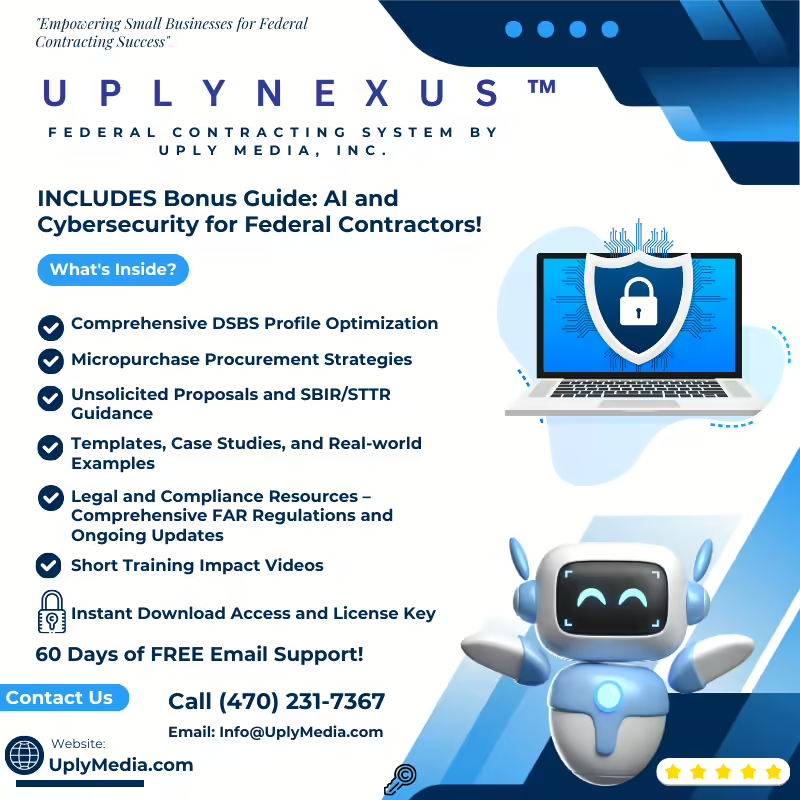Unlocking the Potential of Government IT Contracts for Small Business
The world of government IT contracts for small businesses is both promising and challenging. Small businesses have a unique opportunity to tap into a lucrative market traditionally dominated by larger firms. With the right strategies, small businesses can secure these tech contracts, enhancing their growth and innovation potential. In this article, we delve into how small businesses can effectively compete for government IT contracts and thrive in the tech space.
Government contracts represent a significant portion of the IT market, offering stability and long-term revenue. For small businesses, these contracts can be a game-changer, providing a steady stream of work and an opportunity to showcase their capabilities. However, navigating the complexities of federal IT and B2B government contracts can be daunting. Understanding the processes and requirements is crucial for success.
Small businesses often wonder how they can stand out among larger competitors in the race for government IT contracts. The answer lies in leveraging their strengths, such as agility, personalized service, and niche expertise. By focusing on these areas, small businesses can position themselves as valuable partners to government agencies.
Moreover, small businesses can benefit from various initiatives and programs designed to level the playing field. These include set-asides and mentorship programs that provide opportunities specifically for small enterprises. By taking advantage of these resources, small businesses can gain a competitive edge in securing government IT contracts.
This article will guide you through the essential steps and considerations for small businesses looking to enter the government IT market. From understanding the procurement process to building a strong proposal, we will cover everything you need to know to succeed in this competitive arena.
Understanding Government IT Contracts for Small Business
Government IT contracts for small businesses are a gateway to consistent work and growth. The federal government is one of the largest consumers of technology, offering numerous contract opportunities for small enterprises. Understanding the types of contracts available and the procurement process is vital for small businesses aiming to enter this market.
The first step is identifying the right contract opportunities. Small businesses should focus on contracts that match their expertise and capacity. This involves researching government databases such as SAM.gov, where contract solicitations are posted. By matching their capabilities with government needs, small businesses can increase their chances of winning contracts.
Additionally, small businesses should familiarize themselves with the specific requirements and compliance standards of government contracts. This includes understanding regulations such as the Federal Acquisition Regulation (FAR) and ensuring that their business operations align with these standards. Being well-prepared in these areas can significantly enhance a small business’s competitiveness in the government IT market.

Strategies for Competing in the Tech Space
Small businesses can adopt several strategies to compete effectively for government IT contracts. One of the key approaches is building strong relationships with government agencies. Networking and attending government procurement events can provide valuable insights and connections that can lead to contract opportunities.
Another effective strategy is forming partnerships and collaborations. Small businesses can team up with other firms to combine their strengths and offer comprehensive solutions. This approach not only enhances the value proposition but also increases the chances of winning larger contracts that might be challenging to tackle alone.
Moreover, small businesses should focus on innovation and technology. By continuously evolving and offering cutting-edge solutions, small businesses can differentiate themselves from competitors. Highlighting unique solutions and expertise in proposals can capture the attention of government agencies looking for innovative partners.

Navigating the Proposal Process
Crafting a compelling proposal is crucial for securing government IT contracts for small businesses. The proposal should clearly demonstrate the business’s capabilities and how they meet the specific needs of the government agency. It should also highlight past successes and relevant experience.
Attention to detail is essential when preparing a proposal. Government agencies have strict guidelines and requirements, and failing to adhere to these can result in disqualification. Small businesses should ensure that their proposals are well-organized, concise, and address all the criteria outlined in the solicitation.
Additionally, small businesses should emphasize their value proposition in the proposal. This includes showcasing their unique strengths, such as agility, customer service, and niche expertise. By clearly articulating how these strengths benefit the government agency, small businesses can enhance their chances of winning contracts.
Positioning for Success in Government IT Contracts
Securing government IT contracts for small businesses is a challenging yet rewarding endeavor. By understanding the procurement process, leveraging strengths, and utilizing available resources, small businesses can effectively compete in the tech space. These contracts offer a pathway to growth, stability, and increased market presence.
The key to success lies in preparation and persistence. Small businesses should continuously refine their strategies, build relationships, and adapt to the evolving needs of government agencies. By doing so, they can establish themselves as reliable partners capable of delivering innovative solutions.
In conclusion, government IT contracts present significant opportunities for small businesses willing to invest the effort and resources. By following the strategies outlined in this article, small businesses can position themselves for success and make their mark in the competitive government contracting landscape.
Government IT Contracts FAQ:
1. What types of government IT contracts are available for small businesses?
- Answer: There are several types of contracts accessible to small businesses in government IT, including set-aside contracts (reserved exclusively for small businesses), small business innovation programs like SBIR and STTR, and subcontracting opportunities where small businesses partner with larger contractors. Agencies also offer BPAs (Blanket Purchase Agreements) and IDIQs (Indefinite Delivery/Indefinite Quantity) contracts, which allow small businesses to provide IT services on an as-needed basis.
2. How can small businesses increase their chances of winning government IT contracts?
- Answer: Small businesses can improve their chances by focusing on three key areas: certifications, past performance, and relationship building. Certifications such as HUBZone, Women-Owned Small Business (WOSB), or Veteran-Owned Small Business (VOSB) make businesses eligible for set-aside contracts. Demonstrating strong past performance, even through smaller contracts, can showcase reliability. Building relationships with contracting officers and larger contractors through events, networking, and teaming arrangements is also critical.
3. What resources are available to help small businesses find government IT contract opportunities?
- Answer: Several resources can assist small businesses in locating IT contract opportunities, including SAM.gov (System for Award Management), which lists current federal contracts. Additionally, agency websites (e.g., Department of Defense or GSA), Small Business Administration (SBA) resources, and Procurement Technical Assistance Centers (PTACs) offer guidance on finding and applying for opportunities. Small businesses can also attend industry days and webinars to gain insights into upcoming contracts.
4. What are some best practices for small businesses in preparing a government IT proposal?
- Answer: To prepare a competitive IT proposal, small businesses should focus on understanding the agency’s goals and requirements, tailoring the proposal to demonstrate specific technical capabilities, and showing how their solution addresses the agency’s needs. Clear and concise writing, including a detailed project timeline and budget, is essential. Highlighting any relevant past performance and certifications can also make the proposal stand out. Following all submission guidelines strictly and proofreading for errors ensures a professional presentation.
5. How can small businesses leverage teaming arrangements and partnerships in the IT space?
- Answer: Teaming arrangements allow small businesses to collaborate with larger firms to access more significant opportunities or areas outside their expertise. Through partnerships, small businesses can gain credibility, benefit from shared resources, and access contracts they might not qualify for on their own. Small businesses can find partners through industry associations, contracting events, and government matchmaking programs. Ensuring a clear division of roles and responsibilities in teaming agreements will help establish a successful partnership.


Leave a Reply